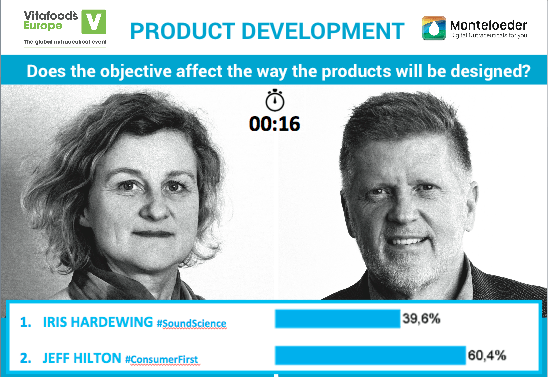Iris Hardewig and Jeff Hilton reflect on this issue and provide insightful predictions on the world of nutrigenomics, the nutraceutical industry and product R&D.
The Vitafoods Fair 2017 took place in May in Geneva. The event welcomed prominent figures from the nutraceutical industry all over the world. In Jeff Hilton’s words, Vitafoods “has just every year expanded, grown, become more influential… It is really the place people do business internationally and I’ve seen it grow over the years and it’s very exciting”.
Jeff Hilton attended the fair as Brandhive’s representative, an American full service branding company. As he explained, Brandhive focuses its activities on “helping companies with strategic planning, creative development, public relations, social media, web and interactive projects”. They work both with branded ingredients and finished goods, and they follow the principle that the consumer always comes first.
Hilton strongly believes that despite that fact that in the process of innovating there are multiple issues that must be taken into account, the consumer is an invaluable asset that companies cannot afford to leave aside. “A good innovation starts and finishes with the consumer”.
On the other hand, from a more science-oriented perspective, Iris Hardewig brought her ideas and experience into the Vitafoods Fair. She expressed her excitement for being part of the event and explained her admiration for Monteloeder as a company “I know Monteloeder’s ingredients, I also was aware of the new app and I was very much attracted to that. That is why I approached Monteloeder about half a year ago, because when I read about the app I wanted to know more about it”.
As Analyze and Realize GMBH’s senior consultant, Hardewig explained that “personalised nutrition will change the way products are going to be developed in the future” and predicted that “science is going to be more important because it is no longer just developing a product but also developing tools to assess the customer’s profile”.
Her argumentation revolves around the idea that innovation must go hand in hand with solid science. She believes that in order to efficiently translate consumer’s needs and wants into meaningful products or nutritional recommendations, it is crucial to generate scientific data that supports it. “If this translation is not based on solid science I think the product is not going to work and it is not going to bring a beneficial effect to the consumer”.
Both opinions were confronted later on in Monteloeder’s face-to-face interactive debate. Here, Jeff Hilton spoke from the point of view of the consumer making use of his experience as a marketing agent who has dealt with numerous ultimate product users. Hilton explained that “the more personalized a product is, the more you have to keep the consumer in mind”. The core of his reasoning was that interaction with the consumer is cyclical and, therefore, you have to identify the situation the consumer is at and then generate a solution that comes back to them and meets their needs. Like Hardewig, Hilton recognizes the importance of research, science and education. However, he explained that science should not lose focus on the consumer. “The R&D process is critical but it has to be rooted in the needs of the consumer.”
On the other hand, Iris Hardewig made reference to the innovative nature of the industry and how, as a result, consumers need to be educated on the use of these devices and products. On top of this, she explained how in order to ensure engagement with consumers and make sure that they repeatedly use the product, they must be able to see measurable benefits based on sound science. “You need to make sure that your product works, otherwise even if you attract the consumer in the first place he will use it only once”.
It could be said that Monteloeder’s second interactive debate was based on a matter of priorities: the emotional perspective that considered human needs and wants as a main priority, and the scientific analytical side that stressed that progress must be based on solid science. In the end, it seems like emotions outweighed rationality, and the audience gave 60,4% of their votes to Hilton and 39,6% to Hardewig.
Monteloeder brought a unique experience to the audience allowing them to become part of this interactive debate while receiving exclusive information on the world of nutrigenomics, precision medicine, and the nutraceutical industry first hand by experts in the field.
Claudia Cardona
Related articles:
https://www.monteloeder.com/blog/2017/07/will-disruption-be-more-likely-from-an-incumbent-within-the-industry-or-from-a-new-entrant/
https://www.monteloeder.com/blog/2017/07/heather-granato-expressed-her-satisfaction-with-the-organization-of-monteloeders-interactive-debate/
https://www.monteloeder.com/blog/2017/08/vitafoods-europe-making-of/
https://www.monteloeder.com/blog/2017/08/monteloeder-at-vitafoods-asia/


